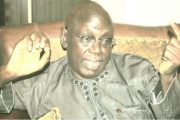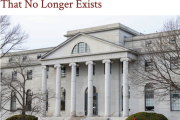The Question About the Northern Question
By Adagbo ONOJA
There is, indeed, something called the Northern Question in Nigerian self-understanding. For the most part, it is the northern puzzle in the National Question in Nigeria. How could the educationally and economically backward north, relatively speaking, be so predominant at the centre? This was the puzzle that was taken to the slaughter slab at the political conference the Abacha regime called into being in 1995. Surprisingly, the issue was resolved and amicably too in the sense that North/South rotation of power was officially endorsed. Why the Abdulsalami regime which succeeded Abacha removed it and made it voluntary for political parties is unclear since even progressive mass organisations such as the defunct National Association of Nigerian Students, (NANS) and the Academic Staff Union of Universities, (ASUU) were already and are still using rotation or zoning or whatever it is called. Ordinarily, these are the platforms where the Marxian sensibility would have been expected to put no such premium on categories such as ethnicity, region and religion in their politics. It strongly suggests that the radicals who designed some of these organisations had by then already come to terms with what the critical theorists were saying about the centrality of subjectivity itself to the Marxian project if it is not to become a dogma that could legitimate any form of instrumental reasoning.

Gen Murtala Mohammed

Gen T Y Danjuma
There has been a slight shift in what the Northern Question is recently. In 2014, The Nation’s Tatalo Alamu conceived of it as “the Sambisa Forest in the heart of an indigenous ruling class which allows the living condition of humanity to deteriorate to the feral subsistence and unremitting harshness such as we find in certain parts of the north”, (See “Sambisa and Other Forests” in The Nation, May 11th, 2014). In other words, he sees it from some form of class analysis, making it an even more interesting concept. For, he is suggesting the existence of the northern ruling class which, in Nigeria, is more or less the same as people holding the government as there isn’t an industrial bourgeoisie in Nigeria and Nigeria type economies. But, does a northern ruling class exist? There are those who would say yes and most likely argue as follows. We need to take their likely positions before we raise the question about the Northern Question.

The late Chief Solomon Lar: the godfather of Emancipation politics
The most obvious one is the way Middle Belt officers and men defined the northern factor in the prosecution of the Nigerian Civil War. Since this could not have happened if there was an unbridgeable fragmentation among the elite of the upper and central north, it stands to reason that we can speak of a northern elite. The war was absolutely unfortunate but no other event can be more important in the history of Nigeria more than the victory of federal forces in that war. Not even 1914 is as important as that victory because anything other than that victory would have taken 1914 itself out of history as far as Nigeria is concerned. So, at that level, we can talk of a northern ruling class although we need more instances as History is not static.

The late Joseph Garba of ‘Diplomatic Soldiering’ fame
The crushing of the coup in which Murtala Mohammed was killed was the handwork of military officers from the Middle Belt. This point stands even as the Middle Belt is, like every other geopolitical zone, an imaginary space which escapes cultural, religious, political, ethnic and even geographical capture. Without going into specifics, the role of T Y Danjuma in the actual crushing of the coup, in managing the succession and in filling the office of Chief of Staff, Supreme Headquarters is enough to warrant the assertion.
The third and last point is how every Middle Belt leader is also a northern leader. General Gowon is a prime example. Even as heady and stormy as Murtala is represented, especially in the aftermath of the January 1966 coup, he had to concede to Gowon’s leadership. For whatever reasons that this happened, it is remarkable, given the tense nature of that time and the military orientation of the players. Beyond that, he remained so for the nine years that Gowon was in the saddle. It is the same story if we take Joseph Tarka who fought the NPC. Elder Paul Unongo said in a recent interview in Sunday Trust that the Tiv alone lost 700, 000 souls in the Nigerian Civil War. Unongo’s figure can be questioned but even then, this would not have happened if Joseph Tarka had come out to dissociate the Tiv from the war. Chief Sunday Awoniyi, Chief Solomon Lar, General Jeremiah Husseini, David Mark, Aliyu Akwe Doma, Joseph Garba and a host of others too numerous to mention, share this characteristic. Even now, some active traditional rulers within the Middle Belt are working behind the scene from this framework. Then look at Bishop Mathew Hassan Kukah up there in Sokoto riding the horse at the Sultan’s 10th anniversary. Someone may say it was just symbolic but what is not symbolic in life? Symbolism matters because it is the source of the most radical insight that structures what becomes the reality we see.

The late Liman Ciroma, the most informed of what the British said the Middle Belt would become
The claim here is that these three examples, all of which border on life and death issues, go to show a self-conscious ruling class which is intact even with its intra-class tension, bitterness and quarrels. The question then is why this relative harmony does not play out at the level of the northern masses? Why is it the case that the comradeship of the northern elite does not transform to the comradeship of the northern masses? Rather, the masses drench each other in blood now and then. Why?
Herdsmen violence and Fulani militia is a completely new phenomenon on the national scale it is today. There is still no conclusive explanation for the Fulani militia phenomenon. It is still not clear which explanation or a combination of explanations applies most out of the commoner ones so far proffered. These are Fulani militia as vanguard of Islamisation (to which Professor Osinbajo and the Sultan swear to the contrary); Fulani militia as specific cultural reprisal response to previous violence involving them; as a political strategy of northern Muslims and finally, impact of climate change. Long before herdsmen violence, however, the north has been defined by vicious violence of ethno-religious sparks. Why has this been the case?
The point in this story is not to answer the question but to raise it. As the late Professor Claude Ake said, raising the question is the more difficult thing as answers are cheap. Anybody can pose an answer. And so many have been posed! One such answer is History as causation. That is, the residual elements of the role of Hausa-Fulanis in the colonial process as being at the heart of the conflicts. The raw materials for this can be found in fantastic intellectual works such as Professor Yusufu Turaki’s The British Colonial Legacy in Northern Nigeria: A Social Ethical Analysis of the Colonial and Post-Colonial Society and Politics in Nigeria; Toure Kaza-Toure’s numerous works on ethno-religious conflicts in Kaduna State and Professor Moses Ochonu’s Colonialism by Proxy: Hausa Imperial Agents and Middle Belt Consciousness in Nigeria. These are solid academic works, not hate speech manuals. But, can these accounts cannot, in themselves, underpin resistance and reprisal relations between Christians and Muslims in the north without an intervening variable? No social scientist would answer yes to this question. The History explanation is, therefore, weak. Conflict managers promote the proposition that the past cannot be changed but the future can be planned. Why these historical accounts have not been used by those who should have used them to plan the future in favour of democratic governance is the question to raise.

Professor Jerry Gana and the twists and turns of the intellectual in politics
An equally pervasive explanation is the thesis of elite manipulation. The evidence here looks formidable but there is a question: what sort of elite would embark on what it must know could be counter-productive to its own very survival as an elite? Hasn’t the aristocracy in the north been as much hit, embarrassed and devastated as anyone else by Boko Haram, for example? There is a third popular thesis which centralises poor governance. Here is what many would dwell upon longer. And they would ask: if you take Ahmed Makarfi, for example, back to Kaduna Government House today, are you likely to have the violence in Southern Kaduna now? Was there no manipulation of religion during his tenure? In the Aside from Makarfi, others would talk about the late Chief Solomon Lar in the Second Republic who, as governor of the old Plateau State, embarked upon what was tagged an Emancipation programme. Its import was lost in inter-party propaganda and representation of it as a move against Hausa-Fulani. In truth, it was a profound expansion of the democratic space of hitherto excluded subjects who had no chance of any inputs into how they governed whatsoever. They must pass whatever inputs they had through an overarching chief who could be a Muslim as much as he could be a Muslim, (remember that Nasarawa State of today was part of the old Plateau State under Solomon Lar.
Some people might be surprised to see a name such as Aliyu Akwe Doma on a list of the very top northern leaders of Middle Belt extraction. It is for the simple reason that he was the Deputy-Governor to Solomon Lar and actually the one who supervised the Emancipation programme in question because, as the information goes, Lar was busy playing the politics of de-campaigning the NPN at the national level. The more interesting point is how Doma as governor of Nasarawa State in 2007 to 2011 reactivated the Emancipation programme. And there was no violence. And Doma is a Muslim. It was thus not non-performance as such that got him out of power after only one term but, principally, his intervention in favour of the Jonathan presidency that infuriated some interests. In any case, Doma has an unsurpassed pedigree in creatively managing identity in northern Nigeria in spite of the damage done to his stature by his foray into partisan politics. We are told he would have been everyone’s consultant by now if he hadn’t.
Even as few as these two examples are, they still tell us so much about the connection between leadership/good governance and peace with particular reference to Plateau and Southern Kaduna where the settler versus natives crisis and the associated violence are preponderant. Ethnicity or religion or whatever identity can be used for violence just as they can also be used for peace. The cognitive interface that makes the difference is the ruling elite. The puzzle in the case of the north is why the elite have been historically together but not the masses. What might be going on? Three guess works are possible. One, either the Muslim segment is, consciously or unconsciously, subverting their non-Muslim counterparts and their non-Muslim counterparts are, for some reasons, unable to know this or talk about it. The Sharia controversy in the 1977 Constituent Assembly, then the OIC controversy under IBB and the introduction of the actual Sharia in the current republic can be cited here. Tatalo Alamu and people who go along with him are thus not off the mark when they say that Boko Haram did not jump from nowhere but that there were dress rehearsals. Two, the northern ruling elite have lost control of who makes it to power and people who ought not to go near any Government House as far as fair and just leadership is concerned found themselves being the landlords. Two things tend to give credence to this. Apparently alarmed by the trend as at 2002, the Arewa Consultative Forum, (ACF) went into drafting a leadership recruitment code. It was republished in 2015, (See Daily Trust, January 16th, 2015, p. 35). Instructively, Hamid Ali, the current Comptroller-General of Customs was a signatory, among others. The second evidence would be T Y Danjuma’s blunt verdict of “Northern Governors Worst, Says Danjuma”, (The Nation, March 5th, 2008, front page lead). Three, there is something the topmost layer of the elite might know that we do not know or cannot know by reading newspapers.
The truth or otherwise of any or all of these guesses would not invalidate the existence of a northern ruling class. If it thus exists, then this ruling elite has a problem on its hand to solve by the challenge of the Fulani militias and the deeper ethno-religious cum natives/settlers related violent. If the number of persons who have viewed the interview this newspaper had with Professor Shedrack Best of the University of Jos as published on January 1st, 2017 is anything to go by, then the northern elite might want to adopt that as one of its working documents contrary to the temptation to perceive his independent mindedness as a sin. No one is expected to agree hundred percent with his views but if his views have been worth the time of so many people across the board, then the interview references itself in spite of the author. There is something called reflexivity. It seems to invite everyone to its hall at a tense moment such as this.


























